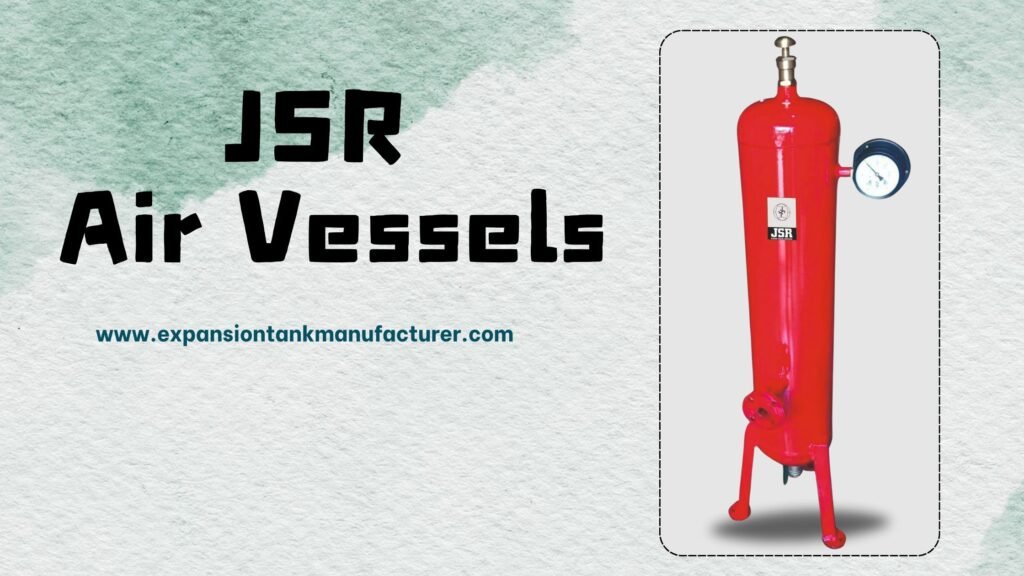In Gujarat, agriculture is the backbone of the economy, and irrigation systems play a vital role in supporting crop growth and conserving water. The state is known to face varied weather conditions and water scarcity issues, so optimizing the performance of irrigation systems is crucial. Among the various components that can improve the efficiency and protection of these systems, the air vessel is one of the most important.
Air vessels, also known as air chambers, are pressure management devices used to protect pipelines in fluid systems. In irrigation systems, these vessels prevent water hammer, reduce pressure fluctuations, and make the flow of water smoother, thus prolonging the life of the irrigation infrastructure.
We will discuss how air vessels can safeguard irrigation systems in Gujarat, the benefits they have, and why they are an indispensable component of modern irrigation systems.
What is an Air Vessel?
An air vessel is a mechanical device used in irrigation pipelines to control pressure and flow. It captures air and traps it within a chamber, usually located at strategic points within the pipeline. The air captured in the vessel acts as a cushion, which absorbs pressure surges and prevents damage to the irrigation system from sudden pressure changes.
JSR Air vessels Manufacturer in Delhi are quite effective in mitigating water hammer, which occurs when sudden changes in water flow (like the closure of valves or shutdown of pumps) produce a pressure wave that may result in pipe ruptures, valve failure, and damage to pumps. These pressure surges are absorbed by air vessels, thereby safeguarding the irrigation system from expensive repairs and time lost.
The Role of Air Vessels in Gujarat’s Irrigation Systems
The irrigation systems in Gujarat have encountered several difficulties over the years, from Saurashtra to Kutch and North Gujarat; these include high-pressure variation, irregular water supply, and fluctuation in pump operation. Air vessels are essential in stabilizing the pressure and making irrigation systems more efficient.
Below are some of the key contributions of air vessels in the protection of irrigation systems in Gujarat:
1. Preventing Water Hammer
These are some common problems in irrigation systems, especially when valves are opened or closed abruptly or while pumps operate irregularly during startup or shutdown. Gujarat is taken place where water fluctuations vary along with irregular power supply frequently; thus, water hammer will cause severe damage to the pipelines, pumps, and valves of irrigation systems.
Air vessels absorb the pressure surge caused by the water hammer, acting as a shock absorber. This reduces the risk of system failures, extending the life of critical irrigation components and ensuring smoother water flow.
2. Stabilizing Pressure in Pipelines
Often, irrigation systems undergo pressure variations, especially in systems with erratic supply of water, irregular operations of pumps, or sudden demands for water. Given the season-dependent variability of supply and availability of reservoirs for water in the agriculture sector of Gujarat, the air vessel serves to regulate pressure throughout the irrigation system.
Air vessels buffer the pressure in pipes, keeping steady pressure in pipelines, which allows for consistent delivery of water through the fields and prevents damage to the system from high-pressure spikes.3. Improved System Efficiency
3. Improving System Efficiency
The major concern about efficient water use would be in the state of Gujarat as its scarcity is increasing with time, especially in regions like Kutch and Saurashtra. Air vessels help optimize the performance of irrigation systems by improving the overall efficiency of water distribution. With better pressure control, the irrigation system can deliver the right amount of water at the right time, reducing water wastage and ensuring crops receive adequate moisture.
The air vessels also minimize the pump’s workload. Under stable conditions, pumps work to save energy and pumping equipment is protected against wear and tear, making the overall system efficiency better.
4. Protecting Pumps and Valves
The most critical part of an irrigation system is irrigation pumps and valves. Any abrupt pressure surges due to water hammer or changes in flow may damage these components, leading to expensive repairs or replacement.
It would act as an air vessel: this is like a buffer area that would consume the pressure increase preventing pump failure and valve damage and is highly imperative in Gujarat’s large irrigation systems that require costly hours to replace equipment.
5. Enhancing System Longevity
Continuous exposure to periodic high-pressure variation and water hammer over a relatively long time indeed shortens irrigation infrastructure lifecycles. Buffers against the pressurized heads and air vessels extend operational time for pipes, pumps, and valves, serving well as important components of water irrigation in systems such as the one needed here in Gujarat.
The inclusion of air vessels in a system will not only reduce maintenance frequency but allow the system to last longer and benefit farmers as well as operators.
Benefits of Using Air Vessels in Gujarat’s Irrigation Systems
The addition of air vessels to the irrigation systems would benefit the different irrigation systems existing in Gujarat for the following main reasons:
1. Reduced Maintenance Costs
Maintenance costs of an irrigation system are significantly lowered due to reduced wear and tear on critical components such as pumps and valves. Air vessels minimize the risk of unexpected breakdowns, which reduces the cost of expensive repairs and downtime.
2. Improved Water Distribution
Air vessels support maintaining constant pressure so that the water supply would be constant throughout the fields, thus leading to better crops and efficient water usage. Optimal irrigation output with minimal losses is achieved where water conservation forms a critical point, such as in the Kutch and Saurashtra regions.
3. Enhanced Energy Efficiency
Air vessels help reduce the load of pumps, thereby improving energy efficiency in irrigation systems. Pumps subjected to many pressure spikes have high energy consumption, but air vessels reduce energy usage by stabilizing pressure and lowering the cost of operational management for farmers and irrigation service providers.
4. Protection Against Infrastructure Damage
Air vessels protect irrigation infrastructure by absorbing the damaging effect of water hammer and pressure variations on pipes, pumps, and valves. The system is given a longer life while minimizing the replacements or repairs to be done soon.
5. Environmentally Friendly
The use of air vessels in irrigation is seen to conserve water, improve energy efficiency, and extend the life of irrigation infrastructure. More and more, farmers are being made to adopt resourceful ways to farm in the face of the rising scarcity of water in the state of Gujarat.
Why Air Vessels Are Essential for Irrigation Systems in Gujarat
Gujarat has a varied agricultural landscape, which includes crops such as cotton, groundnuts, and rice. Such diversified agriculture requires irrigation systems that can deliver water effectively across varied terrains and climates. The state also experiences a high level of evaporation and fluctuating rainfall, making it imperative for irrigation systems to be reliable and efficient.
Air vessels are vital in optimizing irrigation systems by providing steady pressure, saving energy, and avoiding expensive breakdowns. By incorporating air vessels in the irrigation network of Gujarat, the state will be able to protect its infrastructure, ensure sustainable use of water, and enhance crop productivity.
Conclusion
The use of air vessels in irrigation systems across Gujarat offers a solution to many of the challenges faced by the state’s agricultural sector. Benefits such as lower maintenance costs, improved water distribution, and enhanced energy efficiency make air vessels a valuable investment for modern irrigation networks.
Protecting pumps, valves, and pipes through stabilizing pressure and preventing water hammer, air vessels ensure a long life of the irrigation system and smooth functioning of water distribution. In the state of Gujarat, where proper irrigation is essential for the prosperity of agriculture, air vessels become a reliable, cost-effective solution to protect and optimize irrigation systems.
FAQs
1. How do air vessels protect irrigation systems from water hammers?
Air vessels absorb sudden pressure spikes caused by water hammer, acting as a cushion to prevent damage to pipes, pumps, and valves.
2. Can air vessels be used in any irrigation system?
Yes, air vessels are suitable for a wide range of irrigation systems, including drip irrigation, sprinkler systems, and large-scale agricultural irrigation networks.
3. What are the benefits of using air vessels in Gujarat’s irrigation systems?
Air vessels provide benefits such as reduced maintenance costs, improved water distribution, enhanced energy efficiency, protection against infrastructure damage, and more sustainable farming practices.
4. Are air vessels easy to install and maintain?
Yes, air vessels are relatively easy to install in existing irrigation systems, and they require minimal maintenance once in place.
5. Where can I get air vessels for irrigation systems in Gujarat?
Air vessels for irrigation systems can be purchased from local suppliers or manufacturers specializing in agricultural equipment and irrigation systems across Gujarat.




